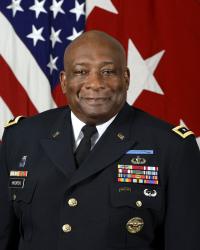2026
One of the United States’ key strategic advantages is a global web of alliances that allow it to project power and influence abroad. Defense security cooperation includes defense trade and arms transfers, humanitarian assistance and disaster relief, institutional capacity building, and international education and training activities. The United States leverages these programs to ensure its allies and partners have the capability to defend themselves and carry out multinational operations while also building up relationships that promote American interests. As near-peer competitors seek to erode U.S. technological advantages, the importance of security cooperation will only grow in the coming years.
On June 4, Brookings hosted a conversation between Senior Fellow Michael O’Hanlon and Lt. General Charles Hooper, director of the Defense Security Cooperation Agency (DSCA), on how DSCA advances U.S. foreign policy objectives in an era increasingly driven by great power competition.
Agenda
-
June 4
-
Moderator
 Michael E. O’Hanlon Director of Research - Foreign Policy, Director - Strobe Talbott Center for Security, Strategy, and Technology, Co-Director - Africa Security Initiative, Senior Fellow - Foreign Policy, Strobe Talbott Center for Security, Strategy, and Technology, Philip H. Knight Chair in Defense and Strategy @MichaelEOHanlon
Michael E. O’Hanlon Director of Research - Foreign Policy, Director - Strobe Talbott Center for Security, Strategy, and Technology, Co-Director - Africa Security Initiative, Senior Fellow - Foreign Policy, Strobe Talbott Center for Security, Strategy, and Technology, Philip H. Knight Chair in Defense and Strategy @MichaelEOHanlonDiscussant
 Lt. Gen. Charles Hooper Director - Defense Security Cooperation Agency
Lt. Gen. Charles Hooper Director - Defense Security Cooperation Agency
-

